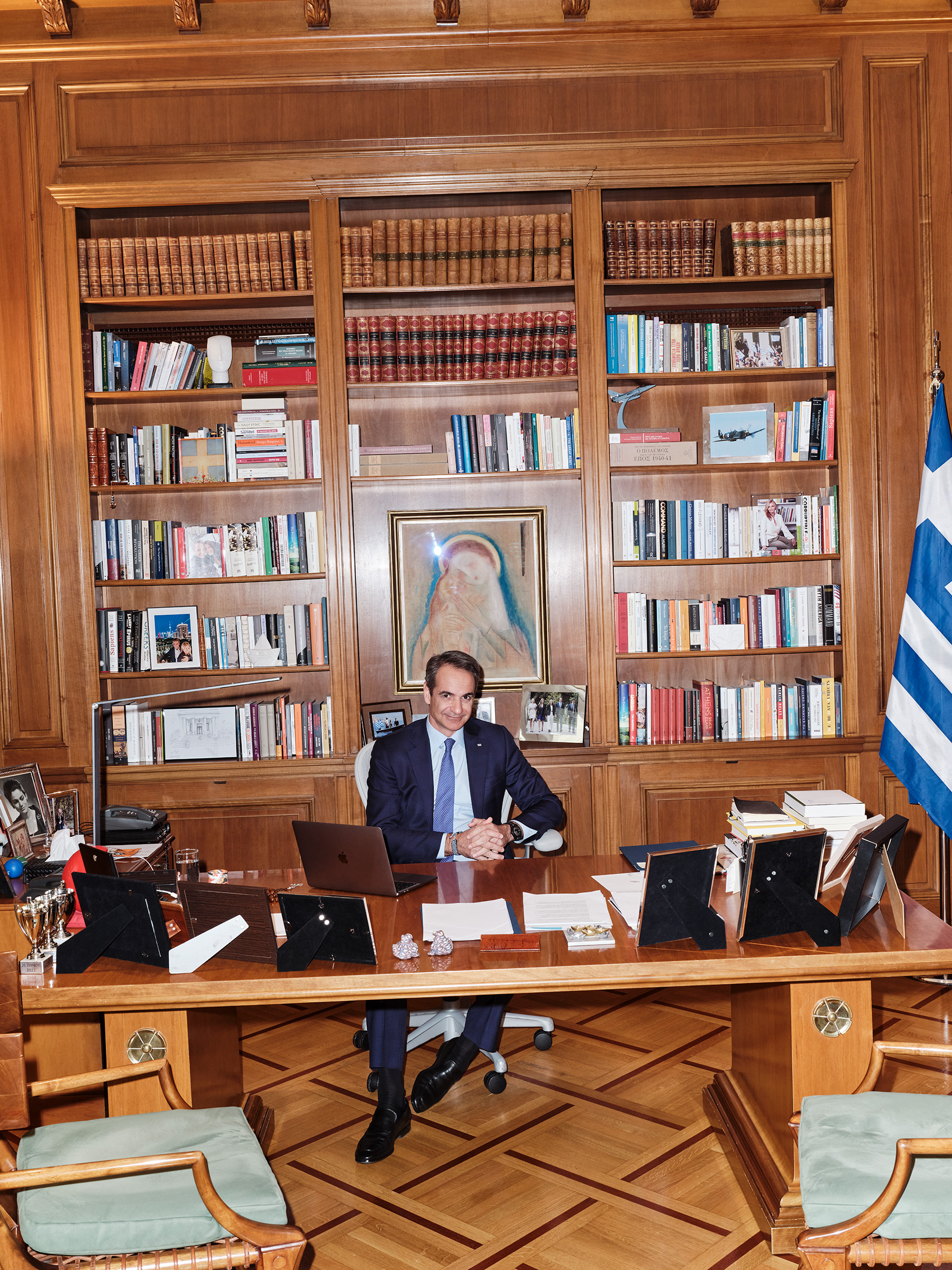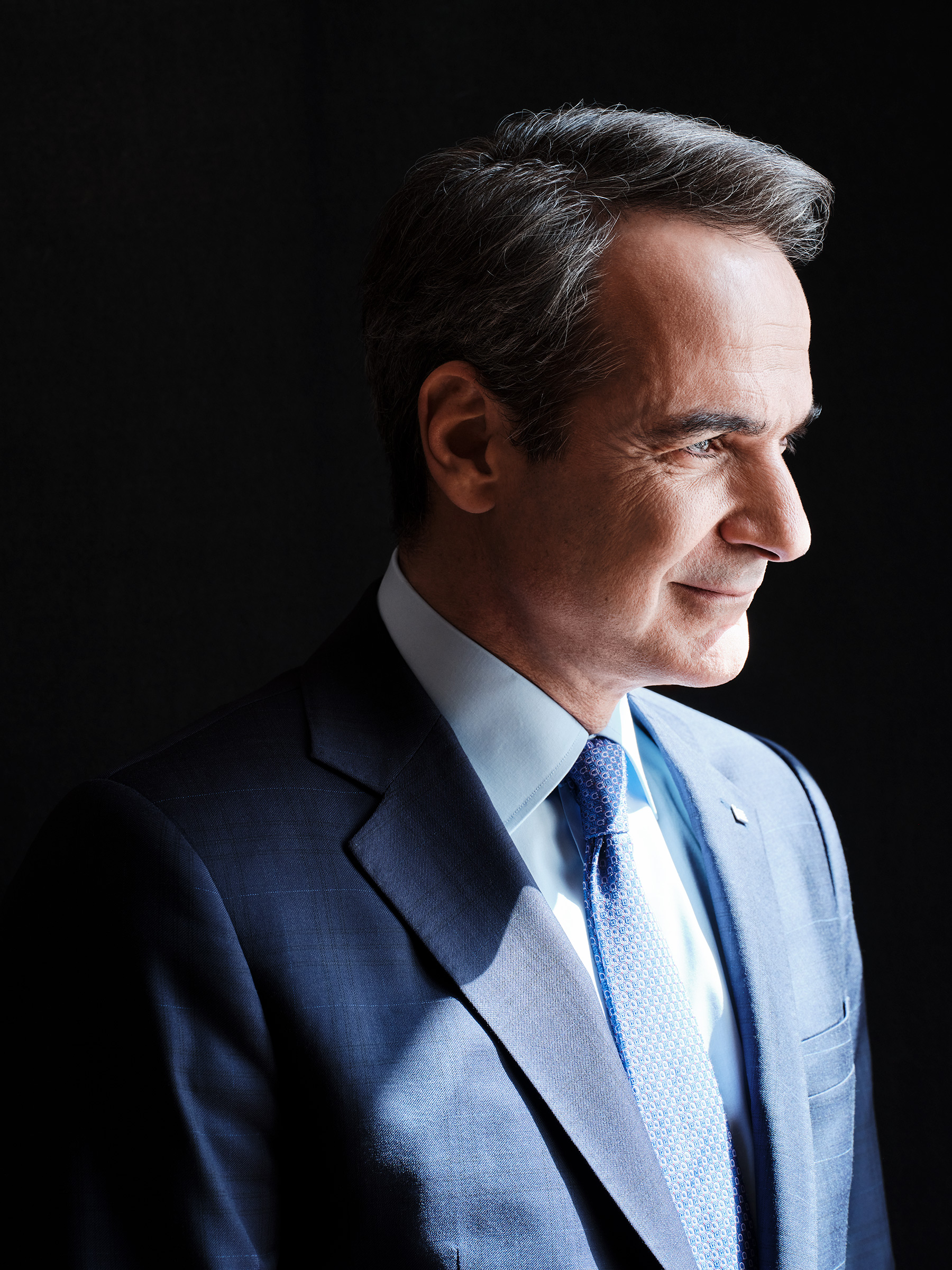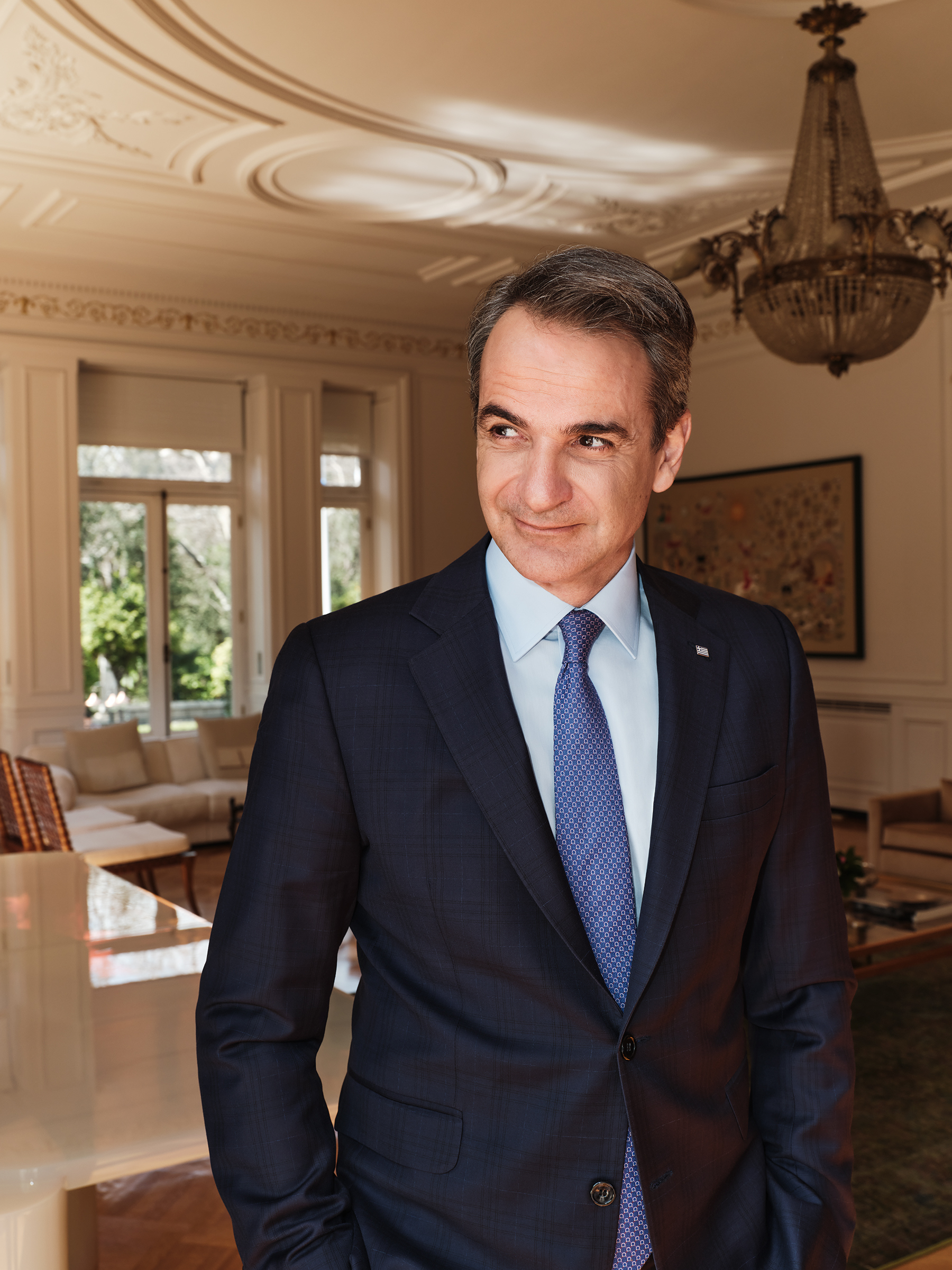Kyriakos Mitsotakis has a confession to make. “Sometimes I watch the footage from my speeches and I always look much taller than everyone else around,” the 6-ft. 1-in. Greek Prime Minister says with a wry smile, buckled up in the back seat of his car in a pressed blue shirt and black hoodie. “Just so you know, there’s a small platform that I climb up that you can’t see in the videos.”
Mitsotakis is addressing his followers on TikTok, where his account so successfully showcases his softer side that it has brought his team a national award. “We are very biased, but I honestly believe it’s the best TikTok of any politician in the world,” says Alex Patelis, his chief economic adviser.
“I loved it,” echoes Mitsotakis, 56, after the two of us sit down in March in his wood-paneled office at the pale pink and white Maximos Mansion in Athens, which has served as the neoclassical workplace of every Greek leader since 1982. He’d spent the past 20 years in politics trying to close the gap between what people thought of him—as someone who “wears a tie” and is “proper”—and his more lighthearted side. “TikTok bridged that, completely.”
That’s not the only way Mitsotakis is surprising people. He legalized same-sex marriage in February—making Greece the first Orthodox Christian country, and practically the only country in the eastern half of Europe, to do so. He took that step despite the ire of the powerful Greek Orthodox Church and lack of support from a third of his own center-right New Democracy party, forcing him to reach across the aisle. “As a matter of principle, the time had come to do the right thing,” Mitsotakis says, fidgeting with his komboloi, or worry beads, as an oil painting of the Virgin Mary looms above.

The legislation has left many with the feeling that Mitsotakis is a different brand of conservative leader. He is socially liberal. Progrowth but fiscally responsible, he says. Tough on migration. Strongly pro-Western and pro-NATO. He thinks he’s found an “interesting sweet spot” and even has a name for it: the “new triangulation.” At a time when incumbents are being hammered around the globe, Mitsotakis can boast that he won re-election with a higher share of the vote than the first time around. (The trophies on his desk with the margins of his 2019 and 2023 election victories are a daily reminder of this.) “That seems to be a formula that’s worked well for us politically,” he says.
It’s a vision, Mitsotakis seems to suggest, that sets him apart from world leaders on both the left and right. Yet he faces headwinds. He has come under fire for a recent spate of tragedies and missteps. And his main goal now is to bring Greece’s living standards in line with the rest of Europe. For a country that’s second poorest in the E.U., after postcommunist Bulgaria, that’s a tall order. “There’s a lot of catching up to do,” he concedes.
Mitsotakis was surrounded by politics from his earliest days. His father Konstantinos, a prominent lawmaker who would go on to be Prime Minister from 1990 to 1993, was arrested and the family put under house arrest following a military coup in 1967; he was born the next year. It was thanks to the Foreign Minister of Turkey, Greece’s historical nemesis, that they managed to escape, first to Istanbul then Paris. They returned to Greece in 1974 once democracy was restored. “My Greek was not very good at the time. I had to struggle in school and make sure I caught up,” says Mitsotakis, who also speaks French, English, and some German. “And so these are my first memories.”
Catch up he did. A graduate of the Athens College prep school, he set off to the U.S. in 1986, where he earned a bachelor’s degree at Harvard and a master’s from Stanford, before going back to Harvard for his M.B.A. A stint at McKinsey in London followed before a turn to private equity in Greece, which he walked away from to become a Member of Parliament in 2004. Being from a prominent political family—he is also a great-great-nephew of former Prime Minister Eleftherios Venizelos, credited as “the Maker of Modern Greece”—opened him up to accusations of nepotism. “I have to work twice as hard to convince people that I’m not here because of my name,” Mitsotakis says.
Few today seem focused on his family. “There’s a respect for this McKinsey, Harvard-educated guy. A Greek done good. Competent, gets things done,” says Kevin Featherstone, a professor at the London School of Economics and Political Science who specializes in contemporary Greece. “But he looks awkward, slightly nervous when talking to ordinary people.” That may be why his TikToks have resonated—and why Mitsotakis’ aides are keen to highlight he’s not so different after all: a favorite band is Guns N’ Roses, and“Paradise City” was his cell ringtone when he first took office.

But it’s ultimately the aura of professionalism that leaves millions of Greeks feeling he is the best candidate for the job—particularly in the wake of the Crisis, as the country refers to the 10 years from 2009 to 2018. Following the global recession of 2007–2009, a nation that had binged on debt saw its main creditors—the European Commission, European Central Bank, and International Monetary Fund—push austerity measures that caused the economy to shrink by a staggering 25%. Incomes and pensions were hit harder, with unemployment climbing above 25% and reaching nearly 60% among youth. No other developed country has experienced a similar economic catastrophe in modern times.
When Mitsotakis first came into office in 2019, things were already looking up. His left-wing predecessor Alexis Tsipras is credited with steering Greece out of the bailout era a year earlier. But Mitsotakis’ approach has won praise since. GDP growth is above the euro-zone average. Unemployment is nearing single digits again. Debt to GDP levels are high but declining among the fastest in the world. The country has regained its investment-grade status. And the Greek stock market is soaring. The Economist even ranked Greece as the world’s top economic performer for the past two years and named it “country of the year” in 2023.
Mitsotakis has also brought substantial investment to Greece. Early on in his first term, he appointed Sir Christopher Pissarides, a Nobel economics laureate, to chair a commission tasked with developing a growth plan. A painstaking 244-page report followed that would prove influential in shaping Greece’s Recovery and Resilience Plan that Mitsotakis presented to Brussels, securing €36 billion in grants and loans through 2026 from the E.U.’s mammoth €800 billion-plus COVID-19 recovery fund.
The amount is equivalent to more than 15% of the entire Greek economy and involves over 100 investment streams and 75 reforms, with about 60% geared toward the green transition and digitization. Greece can now boast that more than half its electricity comes from renewables. Everything from paying bills to renewing a driving license can also now be done online, rather than by lining up at notoriously bureaucratic government offices. “One of the biggest successes of his first term was what was done at the Digital Governance Ministry,” says Yannis Palaiologos, a journalist and author of The 13th Labour of Hercules, about the Greek economic crisis.
Foreign direct investment has also shot up, hitting an all-time high of €8 billion in 2022. Part of that is wooing investors with business-friendly regulation and lower taxes. Amazon, Google, and Microsoft are investing at least $1 billion in Greece, which will create thousands of jobs. But the Greek economy still lags on key metrics like productivity, and there are ongoing concerns about the business and regulatory environment. “They are providing incentives—money—for companies. They are encouraging foreign direct investment,” Featherstone says. “But when he leaves power, how far will the structure of the economy be different? ... I think the jury at the moment is out on that.”
On a visit with Mitsotakis to Metaxa Cancer Hospital in Piraeus, a working-class port city within greater Athens, it’s clear that reforming the economy is not the only challenge he faces. Dozens of hospitals and over 150 health centers are getting an upgrade thanks to E.U. funds and his government. Yet the hospital still feels creaky, not least when we cram into a steel elevator that struggles to get moving—“We are too many,” Mitsotakis says. Some of us exit and take the stairs.
Workers upset over pay and conditions greet Mitsotakis on our arrival, chanting “Give more money to health” and holding up a large banner that reads PERMANENT CONTRACTS NOW TO ALL CASUAL WORKERS. Although Greece has ramped up investment to the health care sector, overall spending and pay remain below the E.U. average. “Look, we inherited a deeply, deeply problematic national health system that had 10 years of underfunding and cuts,” Mitsotakis says. “Hospitals are the most difficult ... But in general, I’d say the mood has improved over what was maybe three, four years ago.”
Then there are tragedies and scandal. One is the February 2023 Tempi rail disaster that killed 57 people, most of them students. “It was a combination of human errors. Horrible human errors. And maybe systemic failures,” Mitsotakis says. The accident, which exposed poor safety measures, prompted the resignation of the country’s Transport Minister and an investigation. But relatives of the victims and survivors have said they have little faith in the inquiry; some 34 railway employees and officials face possible charges, with a trial not expected to start before the summer.


Another is the Pylos shipwreck in June, when an overloaded trawler smuggling some 750 migrants sank off the coast of Greece, killing more than 600 people. Greek authorities say the ship refused assistance. But multiple investigations by media and rights groups, including Human Rights Watch and Amnesty International, suggest otherwise. Adriana Tidona, a migration researcher at Amnesty, says the tragedy could have been averted had Greece “accepted responsibility and taken the appropriate measures.” Mitsotakis bristles at criticism. “Pointing the finger at the coast guard and not at the smugglers seems very unfair to me,” he says.
An altogether different matter is the “Greek Watergate.” Over a coffee in central Athens, Thanasis Koukakis, a veteran business journalist and the scandal’s first confirmed victim, recounts the moment in 2020 when a source told him, “Malaka, you’re under surveillance” and supplied transcripts of private conversations. The wiretapping scandal blew up in the summer of 2022 when an opposition leader was also found to have been surveilled; at least 92 people have been targeted. Mitsotakis fired the head of the National Intelligence Service, and the Prime Minister’s nephew, who was chief of staff and oversaw the agency, has stepped down. He also banned the sale of spyware. “I assumed responsibility. Made changes. Changed the law. Added additional filters when it comes to legal wiretapping,” Mitsotakis says. But concerns linger, with the European Parliament citing the scandal in a February resolution criticizing “serious threats” to the rule of law in Greece.
On the ride back from Piraeus, Mitsotakis points out the window at a laundry list of projects that are meant to underscore that Greece has turned the page, buoyed by favorable macroeconomic conditions and a slate of reforms. Since coming to power, his government has passed more than 400 pieces of legislation covering everything from the labor market and taxation to health care and electrification.
That frenetic pace has won him praise in Brussels and Washington. So has a busy schedule on the international stage. When we meet, Mitsotakis’ team is preparing for a trip to Cairo with other E.U. leaders that would result in €7.4 billion in funding to cash-strapped Egypt, as part of a push to stem migrant flows to Europe. A planned trip to Ankara is also in the works for May, following Turkish President Recep Tayyip Erdoğan’s December visit to Greece, where a “new era” of friendship was promised between the NATO members.

His backing of Ukraine is particularly notable for Greece, a country that shares deep historical ties to Russia. “Nothing against Russian people. But I would never allow Greece to be a geopolitical pariah by not supporting Ukraine in times of need,” he says. That position tested him when a Russian missile struck the port of Odesa during a trip with President Volodymyr Zelensky to the city days before our interview, landing within hundreds of meters of his convoy. Five Ukrainians died in the attack. “We were in a place where we could take no shelter,” he says. “It was a shocking reminder that a war is taking place, and it affects people’s lives every day.”
But even as the Prime Minister keeps his eye on Greece’s role on the world stage, he must answer to voters at home first and foremost. And despite the macroeconomic turnaround, the Greek economy is still considerably smaller than before the Crisis. “The government is rightly proud that Greece is growing faster than the euro zone for the last couple years,” Palaiologos says. “But we must recall that this comes from an economy that lost a quarter of its output.”
It’s a fact that Mitsotakis readily admits. Yet he points out that Greece has a history of remarkable economic gains that he hopes to repeat. “People forget, between the ’50s and the ’70s, the Greek economy was the second fastest growing economy in the OECD, after Japan,” he says. It’s a difficult road ahead, but Mitsotakis is optimistic that Greece has entered a new era of long-term growth. After all, he says with a faint smile, “it’s not that we haven’t done it before.”
More Must-Reads from TIME
- How Nayib Bukele’s ‘Iron Fist’ Has Transformed El Salvador
- What Makes a Friendship Last Forever?
- How to Read Political Polls Like a Pro
- Long COVID Looks Different in Kids
- What a $129 Frying Pan Says About America’s Eating Habits
- How ‘Friendshoring’ Made Southeast Asia Pivotal to the AI Revolution
- Column: Your Cynicism Isn’t Helping Anybody
- The 32 Most Anticipated Books of Fall 2024
Write to Adam Rasmi/Athens at adam.rasmi@time.com
